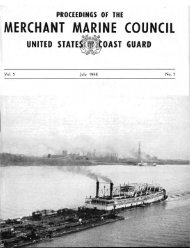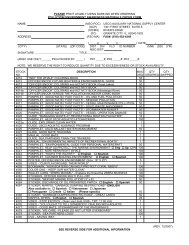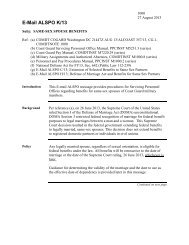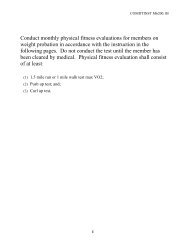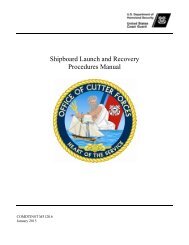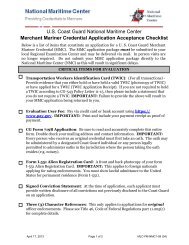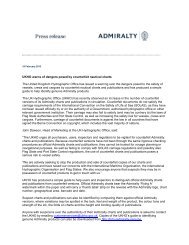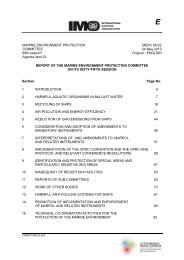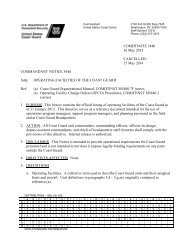Enterprise Architecture Executive Handbook - U.S. Coast Guard
Enterprise Architecture Executive Handbook - U.S. Coast Guard
Enterprise Architecture Executive Handbook - U.S. Coast Guard
Create successful ePaper yourself
Turn your PDF publications into a flip-book with our unique Google optimized e-Paper software.
Type Mandates CGEA Governance<br />
Federal<br />
Electronic Government (E-Government) Act of 2002<br />
(P.L. 107-347)<br />
This law requires agencies to develop performance<br />
measures for implementing E-Government, defined by the<br />
act as "web-based Internet applications or other<br />
information technology to enhance access to and delivery<br />
of government information and services to the public,<br />
other agencies, and other government entities; or to bring<br />
about improvements in government operations." The act<br />
also requires agencies to support government-wide E-<br />
Government initiatives and to leverage cross-agency<br />
opportunities to further E-Government.<br />
<strong>Executive</strong> Order 13011 Federal Information<br />
Technology (1996)<br />
This directive instructs Federal agencies to improve the<br />
management of information systems; refocus IT<br />
management in support of strategic missions; establish<br />
clear accountability for information resources<br />
management activities; and promote a coordinated,<br />
interoperable, secure, and shared Government-wide<br />
infrastructure.<br />
Federal Information Security Management Act<br />
(FISMA - 2002)<br />
As part of the part of the E-Government Act of 2002, this<br />
law establishes a framework to protect the government’s<br />
information, operations, and assets. FISMA requires<br />
agencies to integrate IT security into their capital planning<br />
processes, conduct annual IT security reviews of all<br />
programs and systems, and report the results of those<br />
reviews to OMB.<br />
Federal Records Act of 1950<br />
Establishes the framework for records management<br />
programs in Federal agencies. As the primary agency for<br />
records management oversight, the National Archives and<br />
Records Administrations (NARA) is responsible for<br />
assisting Federal agencies in maintaining adequate and<br />
proper documentation of policies and transactions of the<br />
Federal government. This is done by appraising records<br />
(determining record value and final disposition of<br />
temporary or permanent records), regulating and<br />
approving the disposition of Federal records, operating the<br />
Federal Records Centers, and preserving permanent<br />
records.<br />
Government Performance and Results Act (GPRA)<br />
This law provides for the establishment of strategic<br />
planning and performance measurement in the Federal<br />
government and encourages collaboration between OMB<br />
and Federal Agencies to develop outcome oriented,<br />
program specific performance measures.<br />
12



